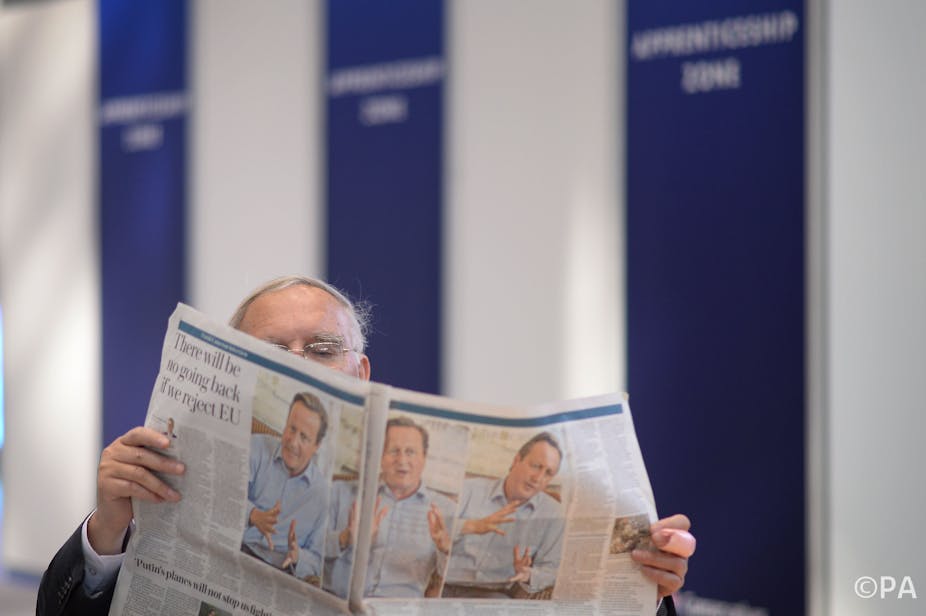Since his re-election in May 2015, David Cameron has devoted much of his time to trying to advance his “renegotiations” with the EU. We know that Cameron has been holding one-on-one talks with the leaders of all other EU member states and he is now meeting his party in Manchester to report on his progress.
But we have very little substantive information about the content of these meetings. The reason for this approach is evident enough. Cameron needs to placate his eurosceptic Tory MPs with the argument that he is in delicate negotiations to secure an important new settlement on the terms of the UK’s EU membership ahead of the referendum to be held no later than 2017.
Cameron’s demands are a mixed bag of items, which he presents under much broader labels including sovereignty, social security and economic governance. This is where he currently stands on each:
Sovereignty
On “sovereignty”, there seem to be two issues: the “ever-closer union of the peoples of Europe” (mentioned in the preamble to the Lisbon Treaty) and the role of national parliaments in EU legislation.

The “ever-closer union” is not a legally precise or operational phrase. It is a broad and sympathetic aspiration and absolutely justified as an antidote to the horrors of Europe’s recent past. But Cameron has chosen to do battle over these three words – and it’s not clear why.
Maybe it is the best textual specimen he could find in the treaty to justify fears that the EU is on some automatic pilot heading towards a federal Europe. Given the political importance that Cameron and his party attach to the phrase, one can imagine that negotiations might lead to more reassuring language being worked out.
The more practical issues – such as the role of national parliaments – may prove more difficult. Radical eurosceptic Tory MPs want Westminster to have the last word on EU legislation and thus for parliament to retain the power to deny the application of “unwanted” EU laws in the UK.
Advocates of this change are essentially asking for secession. There is no sign that Cameron is asking for such a kamikaze option though. The task is therefore to find language to enhance the existing “yellow card” treaty provisions that enable national parliaments query EU legislation.
Social security
There has been good news for Cameron on this front. Social security discussions are actually about intra-EU migration and his desire to limit the welfare benefits on offer to non-British nationals. The European Court of Justice has recently handed down two judgements that help accommodate British concerns. Both confirmed that national authorities, rather than the EU, can decide who qualifies for social welfare benefits. These cases took Cameron by surprise but they mean he can now see that the court has been helping achieve his objectives.
The Commission is also preparing a legislative proposal, expected in December, aimed at amending an existing EU law to tackle welfare abuse by intra-EU migrants. This might go even further to help Cameron, but that remains to be seen.
More broadly there are demands from Tory MPs for opting out of EU labour market regulations. Cameron has not yet made his position clear on this issue.
There has been speculation that if Cameron goes for a renewed opt-out over EU labour market law, there will be pressure from within the Labour party and trade unions to vote for Brexit in the referendum. While Corbyn has tried to dispel this concern, the political response within the UK to a renewed opt-out would be bitterly divisive.
There is at least one easy win for Cameron here. He can confidently tell delegates in Manchester that he won’t allow any further expansion of the EU to lead to massive migrations. All member states have to sign off on every aspect of enlargement agreements anyway so if a new country joined, the UK would have had the right with the other member states to negotiate the terms on free movement.
Dogs that bark no more
In Cameron’s early speeches on Europe, there was talk of repatriating EU powers. Such talk has disappeared from the script since the UK government’s own review concluded the actual balance of competences between the EU and member states was about right.
But eurosceptics in the Conservative party want the legal status of judgements from the European Court of Human Rights to be downgraded to being merely advisory. That would leave the British parliament free to decide whether to follow them or not. Apart from being legally impractical, this would cause huge reputational damage for the UK. The subject seems to have dropped off the agenda and we may hear little about it in formal reports of the Manchester conference.
Despite his attempts to gather evidence and seek compromise on some very big subjects, he has not been able to bring the euroscepticism that pervades his party under control.
Now the British opposition is an unknown quantity and headlines continue to flow about the migrant crisis and the potential for a Grexit. Cameron’s ostensible intent to resolve the question democratically is looking more and more like game of Russian roulette. He should have known that this would happen from the start.

